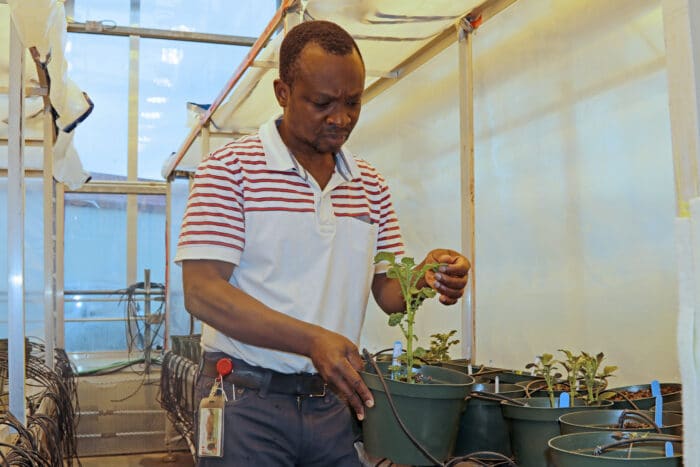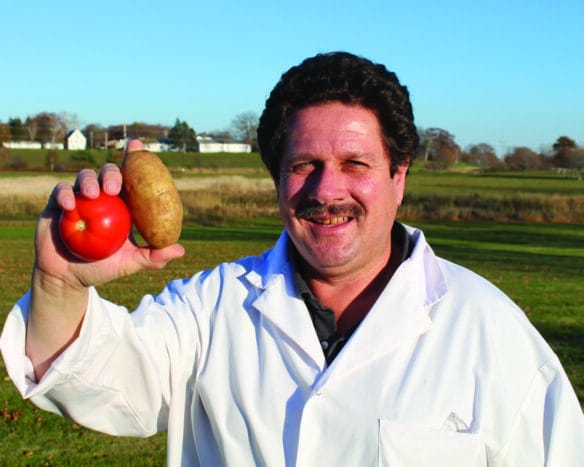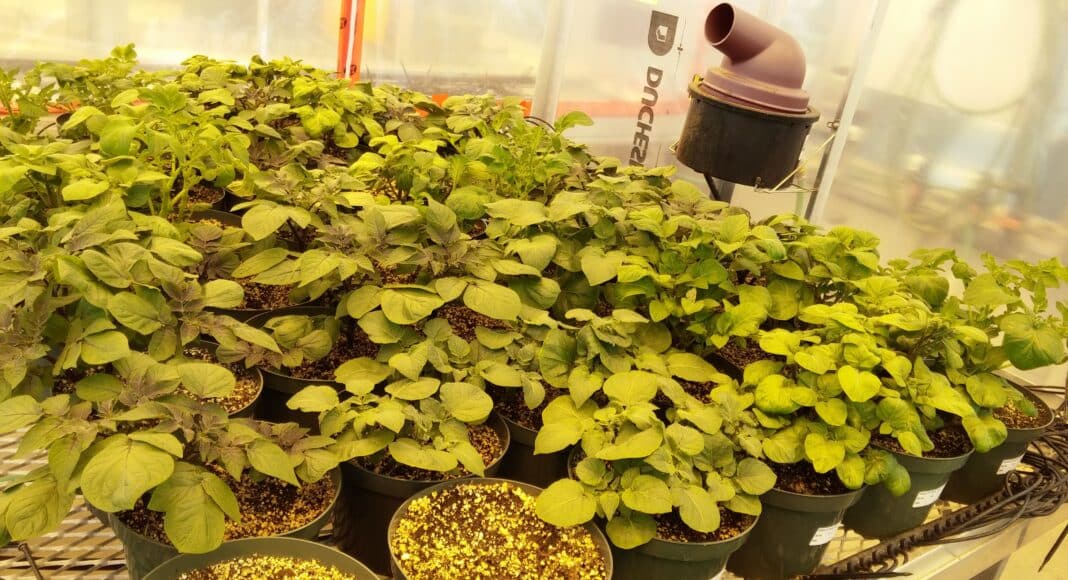AAFC researchers have discovered selenium can help stop late blight, paving the way for a new organic friendly prevention method.
Late blight can wreak havoc on crops. It’s a fast-spreading disease that causes mold symptoms on potato and tomato crops. While there are chemical ways to control it, concern is the potential evolution of the disease and its development of resistance. However, a new natural method may just solve this problem providing a viable control method.
“At origin, we were not targeting specifically late blight. We’re targeting some soil borne pathogens, including some fungal pathogens and disease-causing bacteria. But there were some inconsistencies after applying selenium in soil and I switched from soil application for disease protection to foliar application — one important foliar disease identified after discussion with a colleague was late blight,” Bourlaye Fofana, an Agriculture and Agri-Food (AAFC) geneticist, says in a phone interview.

In 2014, Fofana studied how selenium, a micronutrient or mineral found in soil, water and some foods, could be boosted in foods such as potatoes, soybean and flax. Selenium is essential to the diets of humans and animals. As his studies wrapped, he started looking into what else selenium could help with.
“P.E.I. is deficient in selenium in the soil. And so, they were looking at it almost like as a nutritive additive product in micro quantities,” Rick Peters, a plant pathologist with AAFC, says. “Though they were looking at adding it as an essential micronutrient, so we found disease protection as a side benefit.”
Peters teamed up with Fofana on his research along with PhD student Ashok Somalraju and AAFC research scientist Jason McCallum. The team developed liquid solutions containing various concentrations of selenium and sprayed them onto the leaves of potato plants in the greenhouse at the AAFC Harrington Research Farm in P.E.I. Following the application of selenium, they injected the plants with late blight pathogen spores and then sprayed the plants again with selenium.
“The selenium actually elicited some of these plant defense responses or induced them. And that helped with reducing disease development and late blight development,” Peters said. “The team found that there was some inhibition of the pathogen in the plants too. There could be multiple modes of action here then. It’s not only eliciting plant’s defenses, but also having some direct effect against the pathogen.

“Where there’s multiple modes, you’re a lot more confident that you won’t get resistance development, for example, which is becoming more of a concern for a lot of pesticide products these days.”
The team found that the first spray of selenium solution caused the plant to ready itself to defend against disease while the second spray prevented late blight from growing in the potatoes. The results were replicated in greenhouse trials at AAFC’s Charlottetown Research and Development Centre and in laboratory trials with selenium stalling the growth of late blight in test tubes.
“The plant has an innate capacity, and we’re learning more about this all the time. The plant has the capacity to defend itself from attack by pathogens, and it can be just a matter of stimulating that somehow,” Peter adds.
Due to the risk of late blight spreading, Fofana couldn’t complete the test in an outdoor field setting. He’s confident though the results could be similarly positive for farmers looking to prevent late blight disease in their commercial crops.
Fofana recommends applying selenium to crops when there’s no rain in the forecast for one to two days to ensure maximum effectiveness against preventing late blight. There are additional benefits for farmers after applying this solution. In regions such as P.E.I. where selenium levels are low in soil, this will replenish the micronutrient, helping to improve the plant’s nutritional value.
Selenium application is an environmentally friendly and natural control method meaning it could work for late blight control on organic crops. Fofana is currently working to get selenium added to the Canadian Food Inspection Agency approved products for organic production list.
“The number of products to help protect potatoes and tomatoes especially in organic systems is limited. There are some products for commercial production systems. Otherwise, we’ll be experiencing episodes of late blight every year,” Fofana adds.
The selenium application can be used on conventional farms though, with Fofana mentioning it can be diluted with water and applied at the same time as pesticides to crops.
“Since we don’t know when late blight will be coming, we don’t know yet how often they will reapply,” Fofana says, adding they’re doing further tests on this currently.
Fofana and his team identified genes in potatoes that are activated by the selenium treatment, boosting the plant’s immunity and preventing late blight. They are now working to determine if selenium can prevent other potato diseases after planting.











